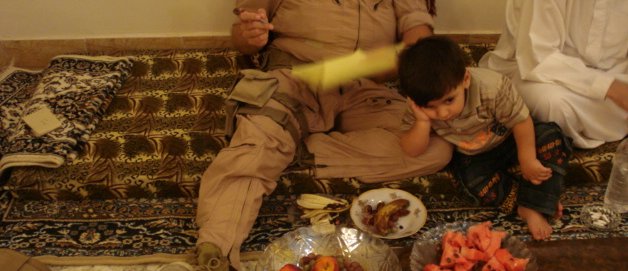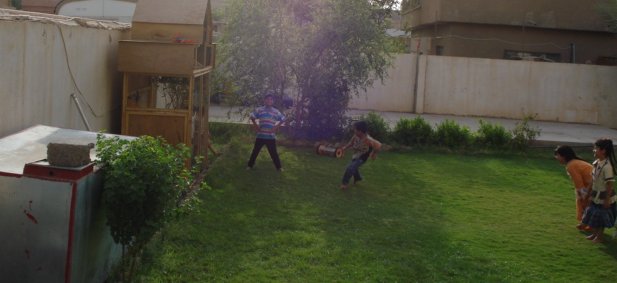
I like the idea of leverage. Our ePRT is small, but we can do a lot by working with partners. More and more we are using our money and expertise as “pump priming*” that gets other efforts going and funds flowing. The ePRT money is reckoned in the thousands. Our partners spend more money, but sometimes our involvement helps lead the way.
The biggest USG player in Western Anbar is the military with its CERP (commanders emergency response program). In the last year, we have also seen I-CERP, which is the same program but using money allocated by the Iraqi government. CERP is used mostly for reconstruction after war damage. Since there is less of this left to be done and as our forces come home, there will be less and less CERP needed or available.
AID funds some effective programs in Western Anbar. The Community Stabilization Program (CSP) is a $544 million program designed to enhance economic and social stability in Iraq. CSP has offices in Al Qaim, Hadithah and Hit. In each place, they employ around eighty Iraqis to do various hometown projects. Our other big programs are the Community Action Program (CAP), which promotes grassroots democracy and better local governance and the Local Governance Program (LGP) trains local officials in the essential skills of governance and the delivery of municipal services. All these programs put Iraqis out front. I like the idea that our programs have an Iraqi face, but I also worry a little about that same thing. I think that we Americans are often too willing -almost eager – to hide our good work. I am willing to share credit; I know we have to get Iraqis in the lead and I understand that we have to avoid the heavy hand, but sometimes I think we hide so well that nobody knows we are doing these things at all. The guys at CSP et al assure me that the right people know where the resources are coming from; I am not so sure and people forget.
Sometimes I would just like to stamp the Great Seal of the United States into some of the concrete we pay to spread – have it set in stone. Maybe I will make that happen, at least in a few places. Memory fades; stone endures.
Some USG funded programs happen almost completely outside my purview, i.e. I am aware of them, but we rarely interact. The one I like the best is Tijara, which gives microfinance loans to small Iraqi businesses. Small loans were very successful in Eastern Europe (the Polish-American Enterprise Fund actually turned a profit while doing good) and a guy in Bangladesh won the Nobel Prize for his work there. Small loans work in development. Small loans are usually better than grants because they have the idea of pay-back, reciprocity. People work harder when they work for themselves and make their own decisions. The repayment rate for these loans is excellent.
The thing I like most about the small loan programs is the money goes to PRIVATE business. One of the biggest faults of most government programs, ours included, is that they tend to fund government and non-profit projects.
Most of the wealth of a modern society is created by the private sector. That is why so much foreign aid actually causes more harm than good. It puffs up the bureaucratic sector at the expense of the entrepreneurs. In the most pernicious case, it merely creates a exploitive kleptocracy, living off foreign largess and playing the PC victim games. I have been very careful here, but I suppose my record is mixed. The nature of government programs creates certain constraints. The loan program, in contrast, has a natural check on its own behavior. The guys taking the loans have to pay them back. That means they must be in a useful or profitable.
Inma is the USAID funded agricultural program. We are trying to get them to help with a green zone in Anah. Beyond that, we have little interaction.
The Iraqis themselves have begun to step up and the activity of the Iraqi authorities is growing rapidly. In the last year, the Iraqis have outspent us 5.5:1 and their spending is rising as ours falls. This is a good and natural outcome. The Iraqis have piles of money from surging oil revenues and there are plenty of useful places to spend it around here. What is really surprising and appalling is the poverty and the terrible state of the infrastructure. Iraq was one of the richest oil producers for generations. With all that money pouring in over fifty years, they managed to build less and more poorly than a place like Jordan, which has no such resource. I expect the new government to do better than the Baathists. Geography and climate dictate that Anbar will never be a really nice place, but it could and should be better developed. And Iraq should take its rightful place as the keystone of the Middle East.
Below – you can grow grass in Iraq, but I have never seen a lawn so green.

* BTW – I recently read the mindset list re what college kids have experienced (or not). This year’s freshmen college students, for example, have never lived under a president who was not named Bush or Clinton. Anyway, I am more conscious of the outdated nature of some of my phrases and analogies. Priming the pump is a historical phrase and few of us have ever actually done it. It means putting some water onto a dry water pump which helps create the suction to draw water from the well. FDR used the phrase. Yes, that was before my time too, but not so far back that I didn’t know the phrase.
